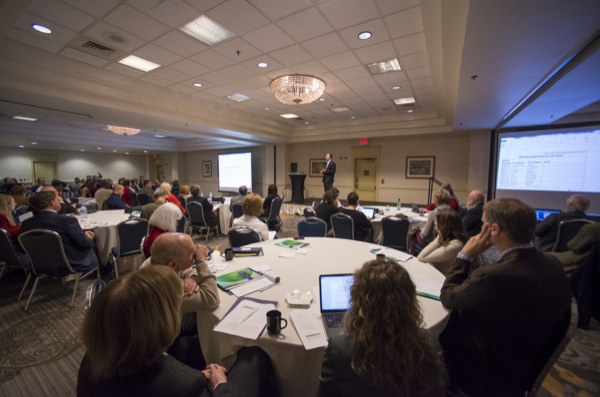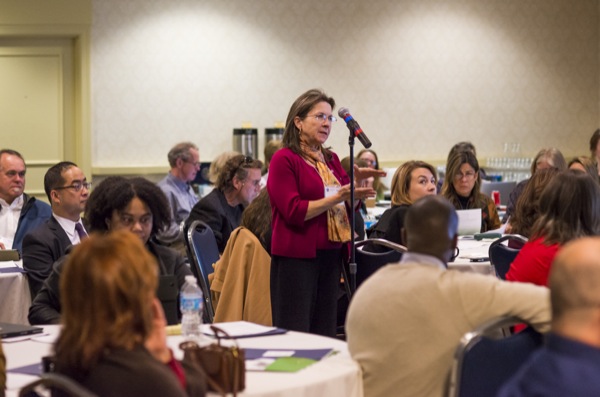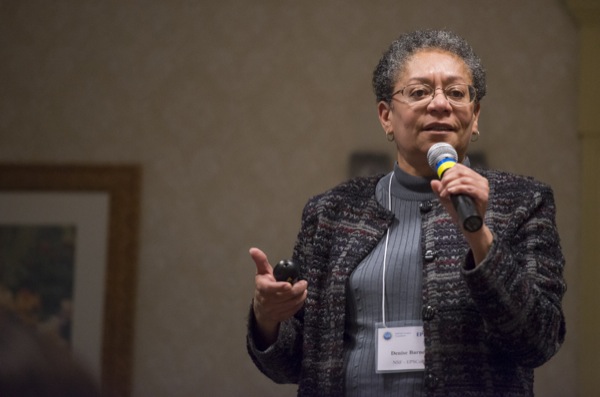


EPSCoR national meeting
Leaders of the 31 state EPSCoR programs gathered in Newark for annual meeting
1:20 p.m., Feb. 7, 2013--More than 100 participants from around the country gathered in Newark for the annual meeting of directors and administrators of the National Science Foundation’s EPSCoR program, Jan. 23-25.
EPSCoR stands for Experimental Program to Stimulate Competitive Research. The program strengthens research and education in science and engineering throughout the United States and seeks to avoid undue concentration of those resources.
Research Stories
Chronic wounds
Prof. Heck's legacy
Through awards known as Research Infrastructure Improvement (RII) grants, NSF invests in multi-institutional and interdisciplinary projects that develop physical, human and cyber infrastructure aimed at improving research competitiveness.
The annual gathering is an opportunity for the EPSCoR community to share knowledge, foster collaborations and provide feedback to NSF, according to Sean C. Kennan, one of several program directors with NSF EPSCoR who were in attendance. Kennan currently oversees Delaware’s EPSCoR program.
“Jurisdictions benefit from each other’s experiences to facilitate successful research projects, learn better practices and achieve research competitiveness,” Kennan said. “There is a wealth of shared knowledge and success to catalyze future progress, and feedback from the EPSCoR community helps guide the critical federal-state partnership.”
This year the meeting also served as a venue for NSF staff to explain some of the changes that are occurring in its merit review criteria and reporting procedures and to give updates on the RII program.
In addition to NSF personnel, participants included jurisdictional EPSCoR project directors, project administrators and directors of education, outreach and diversity (EOD) at the 31 state and territorial EPSCoR jurisdictions. Many of these participants also served as panelists and presenters about various aspects of their programs. For example, directors of several EPSCoR programs shared their experiences in managing “big team” science, in which projects involve multiple investigators and institutions.
Other sessions included training in communicating science led by a team of experienced professionals in broadcast and online media, an annual report “boot camp” for project administrators and a presentation on funding opportunities for cross-jurisdictional education and outreach programs
“The best aspect of these meetings for me is the opportunity to bounce ideas off of my fellow EOD directors in real time,” said Marta Collier of the Arkansas EPSCoR program. “This networking increases our ‘computing capacity’ and generates a wide range of innovative approaches to broadening participation in science and workforce development across jurisdictional lines. Since joining this community two years ago, I continue to be amazed by how we maintain an environment that feels familial, despite the somewhat competitive nature of our jobs.”
As hosts of this year’s meeting, Delaware EPSCoR staff arranged a dinner for the participants at the University of Delaware’s Roselle Center for the Arts, highlighted by a talk about Delaware history by Jonathan Russ, associate professor of history at UD and Delaware’s state historian. Many of the participants were visiting Delaware for the first time.
About Delaware EPSCoR
Delaware has been eligible to receive NSF EPSCoR funding since 2003 and has received two five-year RII grants and two smaller supplemental grants from the program so far, resulting in $23 million in direct EPSCoR funding to the state. As a result of EPSCoR co-funding, Delaware has also received $19 million through 66 additional federal awards to EPSCoR faculty. The Delaware EPSCoR Program also has received $8 million in support from the state of Delaware.
The four institutions of higher education in Delaware that offer science degrees — the University of Delaware, Delaware State University, Wesley College, and Delaware Technical Community College — are partners in the project and receive funding from the program. Delaware’s EPSCoR Program is directed by Donald L. Sparks, S. Hallock du Pont Chair in Soil and Environmental Chemistry at UD and administered by the Delaware Environmental Institute (DENIN).
Article by Beth Chajes
Photos by Kathy F. Atkinson










